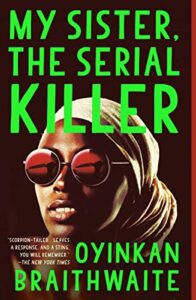My Sister, the Serial Killer by Oyinkan Braithwaite ( Bookshop.org | Amazon.com )
Doubleday, 2018
ISBN-13: 978-0385544238
Available: Hardcover, paperback, audiobook, Kindle edition
My Sister, the Serial Killer, by Nigerian author Oyinkan Braithwaite, is set in Lagos, Nigeria. Korede is the dutiful, protective, perfectionist older sister to beautiful, selfish, lazy, and possibly sociopathic Ayoola. Ayoola has “accidentally” stabbed three different boyfriends to death, and each time she has called Korede to help with the cleanup. According to Ayoola, each time has been self-defense, but, Korede wonders, why is she always carrying a sharp knife if it’s accidental? Korede, following through in covering up the murder, reads his blog and sees his social media. He wrote poetry and obviously had friends and family who are worried about his disappearance. He seems like a nice guy, and Korede wonders if Ayoola really had to act in self-defense.
Korede is a nurse who is very good at her job. She has a long-standing crush on one of the doctors, who has always been a nice guy, and thinks she is finally getting somewhere with him when Ayoola breezes through the door, making an unforgettable impression on him. When Korede expresses her frustration with this, Ayoola tells her there’s no such thing; even so-called “nice guys” like the doctor are after beauty more than they care about anything else, and she’ll prove it. Ayoola then proceeds to sweep him away with her beauty, despite her selfishness, cheating on him, and criticism of him. Korede, worried that he may become Ayoola’s next victim, attempts to warn him and instead of taking her seriously, he accuses her of jealousy, spite, and a lack of sisterly love, confirming Ayoola’s assertion that he isn’t really a “nice guy” after all.
Flashbacks to their childhood and current family relationships reveal that their father was an abusive man who punished Ayoola for being attractive to boys and men, and Korede has been protective of her since then. What’s going on now is clearly tied to the early damage done by the men in their lives. My Sister, the Serial Killer is darkly funny, but it’s also an indictment of the horrors caused by the patriarchy and a solid response to the frequent assertion that “not all men are bad guys”. The nicest guy in this book is completely blind to the harm he’s doing to both Korede, with his accusations, and Ayoola, with his obsession over her beauty. A compelling, disturbing, perceptive, and satirical book, My Sister, the Serial Killer gets inside your head and stays there. Recommended.
Contains: murder, blood, violence, child abuse, implied sexual assault.







Follow Us!